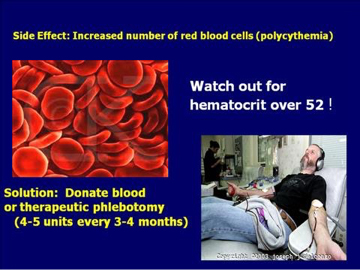Therapeutic Phlebotomy With a TRT Protocol
May 16, 2019

The removal of blood for health purposes has been practiced for several thousand years. Across many societies the act of “bloodletting”, or removal of blood, was thought to cure a multitude of ailments. Ancient Egyptians (circa 1000 BC) believed that occasionally self- sacrificing some blood improved spirituality and cured the body of any illness present. Other ancient societies like the Mayan’s encouraged bloodletting for religious purposes.The removal of blood for health purposes has been practiced for several thousand years. Across many societies the act of “bloodletting”, or removal of blood, was thought to cure a multitude of ailments. Ancient Egyptians (circa 1000 BC) believed that occasionally self- sacrificing some blood improved spirituality and cured the body of any illness present. Other ancient societies like the Mayan’s encouraged bloodletting for religious purposes.
Throughout the advancement of our understanding of how the human body works we slowly realized that getting rid of blood does not cure all illnesses, however there is a benefit from this procedure under specific circumstances.
Today we call the procedure of removing excess red blood cells Therapeutic Phlebotomy, which is the treatment of choice for blood disorders in which the removal of red blood cells and/or iron is needed to manage disease symptoms and reduce complications.
‘Polycythemia’ is one of the more common conditions effectively treated using therapeutic phlebotomy. Polycythemia is an excessive production of red blood cells. With polycythemia the blood becomes very viscous or "sticky," making it harder for the heart to pump. High blood pressure, strokes and heart attacks can occur in left untreated. People with polycythemia usually experience fatigue, weakness, headaches, and hypertension. Polycythemia is a symptom which occurs with a variety of known and sometimes unknown origins.
Here are just some examples of known origins of polycythemia:
- Heavy smoking
- Dehydration
- High levels of stress
- Lung diseases or disorder
- Certain medications and drugs
- Exposure to high altitudes
- Too much Testosterone (see below)
- Obesity
Testosterone (TRT) & Elevated Red Blood Cell Production- Polycythemia
Some men and woman are genetically prone to getting polycythemia, and more commonly people have poor lifestyle choices which result in too many blood cells (smoking, for example). The association between testosterone replacement therapy (TRT) and polycythemia has been reported for the past few years as the use of testosterone replacement has become more common. In addition to increasing muscle and sex drive, testosterone can increase the body's production of red blood cells. This hematopoietic (blood-building) effect could be a good thing for those with mild anemia.
Most men on Testosterone Replacement Therapy who are being properly monitored by an experienced TRT doctor do not experience polycythemia. Women taking testosterone typically do not have to worry about polycythemia resulting from the testosterone itself due to being prescribed a much lower dosage of testosterone than men (Read more about Testosterone in
Women-make clickable to: http://defymedical.com/blog/item/18-testosterone-replacement-for-women-too
For those patients who do experience elevated red blood cells it can be effectively reversed with a therapeutic phlebotomy where typically one pint or blood is removed and discarded. This could also be done by volunteering for a blood donation in which one pint is usually taken. Doctors may prescribe a therapeutic phlebotomy every 8-12 weeks for patients with persistent polycythemia, or more frequently until the red blood cells return to normal.
Once the phlebotomy (or donation) is complete many patients immediately feel better and high blood pressure returns to normal. People who suffer from chronic polycythemia may need routine therapeutic phlebotomies to keep red blood cells within a consistent healthy range.
Testing Hematocrit Is Important for Patients on TRT Follow up blood testing is required at least twice per year for any patient receiving hormone and testosterone medications. One of the reasons follow up testing is important is to monitor red blood cells including one of its primary components called hematocrit. The test that measures your blood cells including hematocrit is called the Complete Blood Count or CBC.
An experienced TRT doctor will make sure blood cells and hematocrit are maintained within a healthy normal range and will correlate test results with your testosterone levels and lifestyle factors, making adjustments to medications if needed along with ordering a Therapeutic phlebotomy if hematocrit becomes too high.
Here is a very informative article which explains polycythemia caused by TRT and how to effectively manage it.
How to Manage High Red Blood Cells Caused By TRT
http://www.defymedical.com/resources/health-articles/308-how-to-manage-polycythemia-caused-by-testosterone-replacement-therapyOther Possible Health Benefits
Therapeutic Phlebotomy can be an important new method of treatment for some patients, especially for people who suffer from hypertension (high blood pressure). A small study conducted by Immanuel Hospital in Berlin found that therapeutic phlebotomy caused a marked decrease in both blood pressure and “bad” cholesterol levels. This latest study was prompted by earlier research which suggested regular blood donors have lower cholesterol and reduced risk of heart problems and stroke.
Defy Medical patients who receive therapeutic phlebotomy for the treatment of high hematocrit and high blood pressure have been observed to have an immediate decrease of blood pressure, returning to a normal range. Other studies show that diabetics had better blood sugar control when they had blood regularly removed.